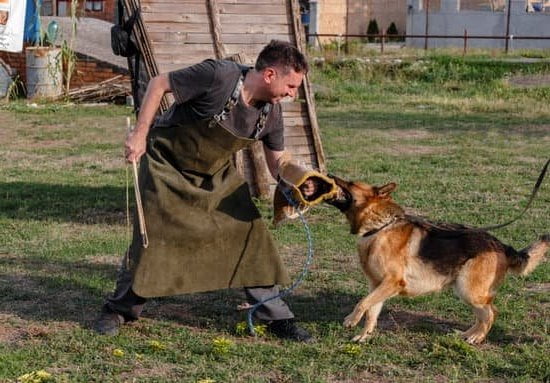Dogs will often bite their owners or other people as a way of communicating their feelings or trying to get something they want. If your dog is biting you, it is important to train it to stop. There are a few different methods you can use to train your dog to stop biting.
The first step is to understand why your dog is biting. Once you know the reason, you can work on correcting the behavior. Some common reasons dogs bite include fear, excitement, frustration, and aggression.
If your dog is biting out of fear, you will need to work on building its confidence. You can do this by providing positive reinforcement when your dog behaves appropriately. You can also try obedience training to help your dog learn to trust you.
If your dog is biting out of excitement, you will need to work on teaching it to control its impulses. You can do this by teaching it to sit or stay in place until it is calm. You can also use commands to distract your dog from biting.
If your dog is biting out of frustration, you will need to work on teaching it to tolerate frustration. You can do this by providing plenty of positive reinforcement when your dog behaves appropriately. You can also try obedience training to help your dog learn to listen to you.
If your dog is biting out of aggression, you will need to work on correcting the aggression. You can do this by providing plenty of positive reinforcement when your dog behaves appropriately. You can also try obedience training to help your dog learn to trust and respect you.
How To Train Your Dogs To Stop Fighting
It is natural for dogs to want to dominate each other. However, when two dogs live together in the same home, this can lead to fighting and aggression. The good news is that there are ways to train your dogs to stop fighting.
The key is to establish yourself as the pack leader. This means that you must be in charge of everything your dogs do. You must be the one who decides when they eat, sleep, and go outside. You must also be the one who disciplines them when they disobey.
When your dogs know that you are in charge, they will be less likely to fight. You can achieve this by using positive reinforcement. Whenever your dogs obey your commands, give them a treat or praise them. This will help them to understand that you are in control and that they need to listen to you.
Another way to prevent fighting is to provide your dogs with plenty of exercise. A tired dog is less likely to get into a fight. Make sure to take your dogs for long walks or play fetch with them in the yard.
If your dogs are still fighting, you may need to seek professional help. A behaviorist can help you to train your dogs to stop fighting and to better understand their behavior.
How To Train My Dog To Stop Barking At Me
There are many reasons why a dog might bark at its owner, but most of the time, it’s simply an attempt by the dog to get attention. In order to train your dog to stop barking at you, you’ll need to first determine why it’s doing it. Once you know the reason, you can begin to work on a solution.
If your dog is barking for attention, the best way to train it to stop is to ignore it. When the dog barks, don’t make eye contact, don’t speak to it, and don’t touch it. If you do, you’ll be rewarding the behavior, and it will only continue. Eventually, the dog will learn that if it barks, it won’t get the attention it desires.
If your dog is barking out of excitement or fear, you’ll need to take a different approach. You’ll want to begin by teaching your dog to “speak” or “quiet” on cue. Once your dog is responding consistently, put it in situations (outside, during a car ride, etc.) where it’s likely to bark and make sure only to give the cue to “speak” or “quiet” when it’s actually barking. If the dog barks when it’s not supposed to, don’t give it any attention (positive or negative). This will help to extinguish the behavior.
How To Train A Dog To Stop Barking At Everything
There are a few things you can do to train your dog to stop barking at everything. One is to create a cue or signal for your dog to stop barking. This could be a hand signal or a word that you say to your dog. When your dog barks, say “quiet” or give them the hand signal for “quiet” and if they stop barking, reward them with a treat or petting.
Another thing you can do is to teach your dog to “speak” or “bark” on cue. Start by teaching your dog to bark when you say the word “speak.” Once your dog is reliably barking when you say “speak,” start asking them to bark only when you give them the cue, such as when you see someone walking down the street. If your dog starts barking at everything, say “speak” and then give them the cue to stop barking. This will help your dog understand when it’s appropriate to bark and when it’s not.
If your dog is barking for attention, you can try to redirect their attention to something else. When your dog starts barking, say “no” in a firm voice and then offer them a toy or a treat to distract them. If your dog is barking out of excitement, you can try to calm them down by saying “calm down” in a soft voice and petting them.
It’s important to be patient and consistent when training your dog to stop barking at everything. It may take a little time and patience, but eventually your dog will learn to stop barking at everything.
How Do I Train A Dog To Stop Barking
?
There are a few things you can do to train your dog to stop barking. The first is to make sure that you are providing enough exercise and stimulation. A dog who is bored or restless is more likely to bark. You can also try training your dog to respond to commands like “quiet” or “stop.” If you catch your dog barking, say “quiet” in a firm voice and reward them with a treat when they stop. Be consistent with your commands and rewards, and eventually your dog will learn to stop barking when you ask them to.

Welcome to the blog! I am a professional dog trainer and have been working with dogs for many years. In this blog, I will be discussing various topics related to dog training, including tips, tricks, and advice. I hope you find this information helpful and informative. Thanks for reading!





